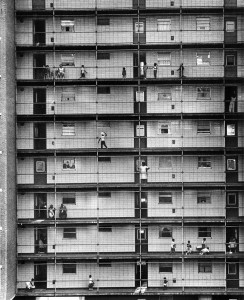 Baltimore City takes the first steps to privatize public housing starting with a proposal to transfer more than 2,000 units to private developers, with the promise that the new owners will make repairs to upgrade the properties.
Baltimore City takes the first steps to privatize public housing starting with a proposal to transfer more than 2,000 units to private developers, with the promise that the new owners will make repairs to upgrade the properties.
_______________________________
Public Housing Heads Toward Private Owners
By Adam Bednar, in The Daily Record
Baltimore’s spending board approved a major step in privatizing the ownership of more than 2,000 affordable housing units.
The Board of Estimates approved the framework for payment in lieu of taxes agreement with future investors in the properties on Wednesday and authorized the director of finance to execute the individual agreements.
Early last year, the Housing Authority of Baltimore City announced it had been selected to participate in the U.S. Department of Housing and Urban Development’s Rental Assistance Demonstration Program. The program allows for 600,000 public housing units of public housing nationwide to be sold to private entities.
Under the program, the federal government provides 4 percent low-income housing tax credits that the developers sell to companies that use the credits to offset earnings. In turn, the investor uses the money from the tax credit sales to rehab properties and benefit from a boost in rent subsidies from the federal government.
The housing agency argued that it needed to sell the units because it cannot afford the upkeep because of cuts in federal spending.
“Baltimore has felt the pinch of underfunding and lost public housing units. In addition, the remaining stock of public housing is in desperate need of rehabilitation,” according to the spending board’s agenda. “The HABC estimates that it its entire portfolio requires about $800,000,000.00 of capital improvements.”
The board’s approval allows housing to execute 12 individual agreements with 10 developers including Enterprise Homes, Pennrose Development and Landex Development.
But not everyone is a fan of the move to privatize some of the city’s public housing stock.
City Council President Bernard C. “Jack” Young voted against the proposed frameworks and permission for them to be executed. Young said he voted against the tax agreements because he is against privatization — in this case because it will mean lost jobs at the housing authority.
“They have certain developers who have agreed to fix up the properties and they will manage them. I think in 20-30 years the city has the option of buying it back after that period.” Young said. “But I’ve never known the city go and buy something back.”
